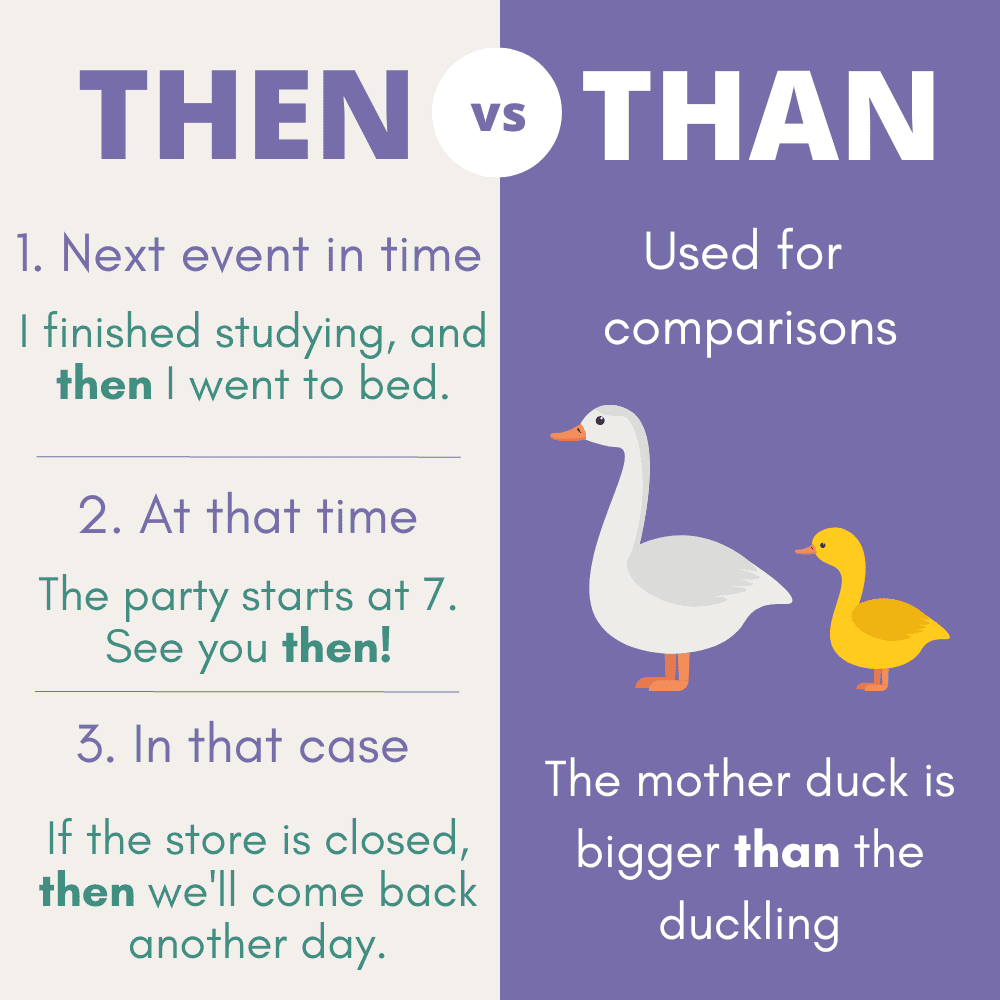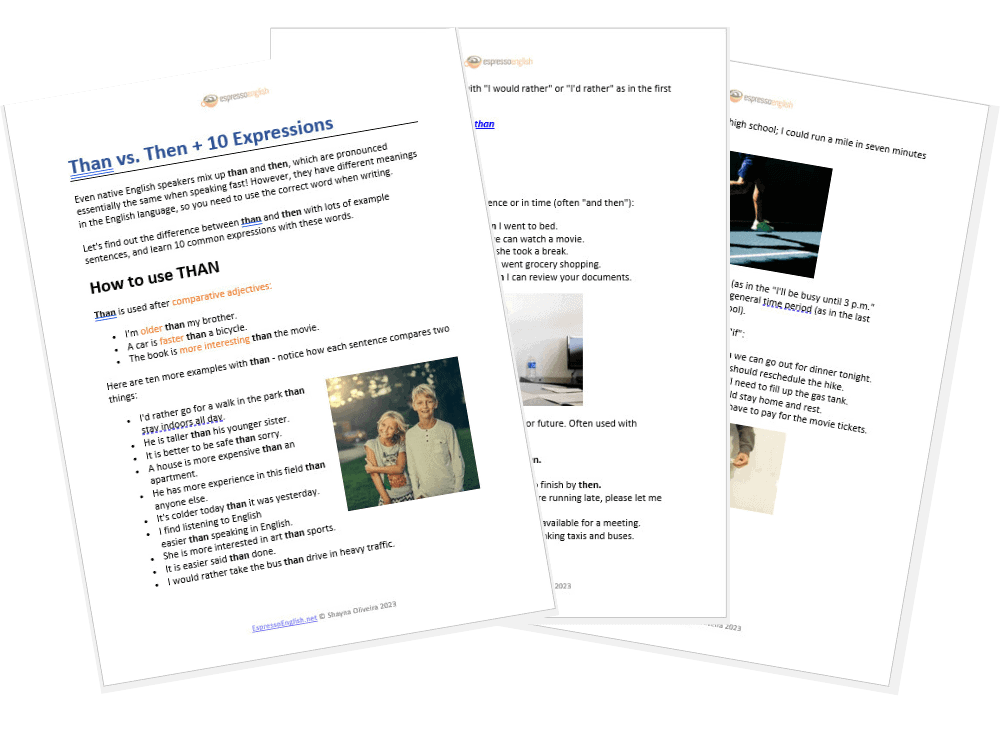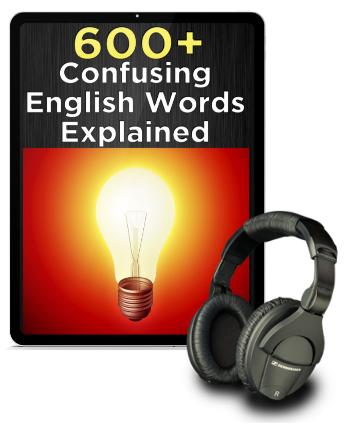
When should we use then vs. than? Even native English speakers mix up these two common words, which are pronounced essentially the same in fast spoken English! However, they have different meanings in the English language, so you need to use the correct word when writing. Let’s learn the difference between then and than with examples.
Than: Grammar & Examples
Than is used after comparative adjectives:
- I’m older than my brother.
- A car is faster than a bicycle.
- The book is more interesting than the movie.
Here are ten more examples with than – notice how each sentence compares two things:
- I’d rather go for a walk in the park than stay indoors all day.
- He is taller than his younger sister.
- It is better to be safe than sorry.
- A house is more expensive than an apartment.
- He has more experience in this field than anyone else.
- It’s colder today than it was yesterday.
- I find listening to English easier than speaking in English.
- She is more interested in art than sports.
- It is easier said than done.
- I would rather take the bus than drive in heavy traffic.
We can express our preferences with “I would rather” or “I’d rather” as in the first and last examples!
Even more example sentences with than

He is taller than his younger sister.
Then: Grammar & Examples
Then is used in several ways:
1. To describe the next event in a sequence or in time (often “and then”):
- I finished my homework, and then I went to bed.
- Let’s have dinner first, and then we can watch a movie.
- She studied for the test, and then she took a break.
- He cleaned the house, and then he went grocery shopping.
- I need to finish this report, and then I can review your documents.

I need to finish this report, and then I can review your documents.
2. To mean “at that time” – could be in the past or future. Often used with by/before/after/until/back:
- Come to my house at 7:30, I’ll be ready then.
(then = at that time) - The deadline is December 31, so we need to finish by then.
- Let’s meet at the restaurant at 7 p.m. If you’re running late, please let me know before then.
- I’ll be busy until 3 p.m., but after then, I’ll be available for a meeting.
- We’ll buy a car next week. Until then, we’re taking taxis and buses.
- I was in really good shape in high school; I could run a mile in seven minutes back then!
Sometimes “then” refers to an exact time (as in the “I’ll be busy until 3 p.m.” sentence), but in other cases it refers to a general time period (as in the last sentence about the years I was in high school).

I could run a mile in seven minutes back then.
3. To mean “in that case” – often used with “if”:
- If you don’t have any other plans, then we can go out for dinner tonight.
- If it’s going to rain tomorrow, then we should reschedule the hike.
- You want to borrow my car? Then you’ll need to fill up the gas tank.
- If you’re not feeling well, then you should stay home and rest.
- You forgot your wallet? Then I guess I’ll have to pay for the movie tickets.

You forgot your wallet? Then I guess I’ll have to pay for the movie tickets.
Even more examples of then in a sentence

Pronunciation of Than and Then
In spoken English, these words often sound exactly the same!
Listen to these two example sentences:
- I’m older than my brother.
- First we went to the store, and then we went to the post office.
Common Collocations & Expressions with Then and Than
When you learn English words, it’s also good to study some common expressions with them – since we don’t use words in isolation; we always use them in phrases! Let’s learn popular phrases with these two words:
Common collocations with than include:
earlier than / later than
- My alarm goes off at 8AM; I don’t like to wake up any earlier than that.
- Our 12-year-old son is allowed to stay up later than our 5-year-old daughter.
Learn more about the phrases no earlier than / no later than
rather than
Rather than means something like “instead of” or “not”:
- You should do something about the problem rather than complaining about it.
(= instead of complaining about it) - He wants to be a teacher rather than a businessman when he grows up.
(= not a businessman)
other than
Other than means “except” or “besides / in addition”:
- I have an English class at 7PM. Other than that, I have no plans for the day.
(= I have no plans except for the English class) - She speaks three different languages other than English.
(= in addition to English)
better than / worse than
We use these to compare things in terms of being good or bad:
- The second movie was better than the first – it was more exciting.
- Sorry I’m so late. The traffic was even worse than usual.
Learn why we never say “more better”
more than / less than
We use more than and less than to compare quantities:
- She makes $50K/year and I make more than her – about $65K/year.
- The trip to the airport takes less than an hour by train.

The trip to the airport takes less than an hour by train.
Common phrases with then include:
well then!
This phrase expresses surprise; in reaction to someone saying or doing something unexpected or shocking.
“I’ve never really liked you.”
“Well then! If that’s how you feel, we shouldn’t be friends anymore.”
every now and then
Every now and then means “occasionally”:
- I don’t go to the mall often; I stop by every now and then when there’s nothing else to do.
see you then!
We say “see you then!” after we’ve made plans to meet up with someone at a specific time:
“The festival starts at 1, so come on over to my house at 12:30 and we’ll go together.”
“OK, see you then!“
then again
We say then again to introduce a contrasting thought or opposite point of view.
- I’d love to buy a new car. Then again, the car we have still works just fine.
right then and there
Right then and there is an informal way to say “in that exact place and time.”
- After Peter showed up an hour late to work, the boss fired him right then and there.
even then
Even then means something like “in spite of” – when something still happens even though there are things that go against it.
- I presented ten different reasons this was a bad idea, but even then, he wouldn’t change his mind.

I argued with him for hours. Even then, he wouldn’t change his mind!
Now you know when to use then vs. than, so you won’t make mistakes with these two words that sound alike, but have different meanings! And you’ve also learned some common phrases with then and than – try to make your own example sentences using these.
The English language has a lot more confusing words – you can learn more than 600 of them in my e-book!
Download Than & Then PDF + Quiz


